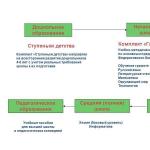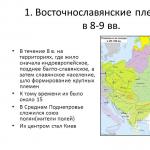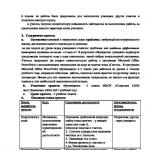What dangers await teenagers. The dangers that lie in wait for today's children
Modern children cannot imagine their life without the Internet. Communication, information for essays, and even homework - they all find it on the Web. Well, if this is the case and limited.
The Internet has literally invaded our lives. Scrolling through social networks for a morning cup of coffee, checking mail in transport, checking in at a trendy cafe - these are our real everyday life. What can we say about children who literally live in a virtual world.
Today we talk about what rules of communication on the Internet you need to instill in a teenager so that he maintains his mental and physical health, reputation among peers, future career and your own budget.
Rule #1: Don't Chat with Strangers
We talk about this to children, starting from kindergarten age - you can’t talk to strangers. The same applies to network communication, but many people forget about it. Virtual strangers are even worse than real ones - no one knows who your child is talking to. By pretending to be a peer, an attacker can ingratiate himself, and the consequences will be disastrous. Unobtrusively and accurately, a virtual friend will find out from your child both the well-being of the family (“What kind of car do you have?”), And vacation plans - what else does a robber need?
The option that a pedophile is sitting on the other side of the monitor cannot be ruled out either. He can persuade your son or daughter to meet, or he can engage in online grooming for a long time. The term refers to the sexual exploitation of a child. For example, an attacker pretends to be a representative of a modeling agency and asks a child for a photograph of a negligee “for casting”. And then they blackmail him with them, getting new and more and more candid shots.
And a familiar person can also communicate with your teenager, but with nasty intentions. Cyberbullying is popular among high school students - bullying on the Internet. That is, a “friend” whom your child knows personally, ferrets out revelations, saves bad photos for himself, and then publishes all this in the public domain with a link to the “victim” page. Ridicule, bullying sometimes have the same tragic consequences as real bullying. All this is exacerbated by the fact that children usually hide cyberbullying from their parents and experience the situation silently and alone.
What to do: Tell in detail about all of the above and ask the child in the virtual world not to be frank with anyone, even if the most beautiful girl in school writes to him. With strangers - a minimum of communication.
Rule #2: Stay anonymous
In addition to social networks, there are other Internet resources on which the child spends a lot of time and where he communicates with strangers. Forums, game chats, blogs, Skype, WhatsApp, Viber - here it is impossible to communicate only with those you know personally. That is why it is so important to remain anonymous.
What to do: do not put a real photo on the profile picture, do not tell the players your real last name and first name, do not discuss personal life. In programs for quick messaging, set privacy settings - those who are not in the address book will not be able to write anything to your child.

Rule #3: Financial Security
Teenagers also make purchases on the Internet - they pay for both real goods and virtual property: programs, game bonuses. This is fraught with gaps in the family budget.
What to do: do not save bank card details in the browser, authorize payments (to confirm the purchase, an SMS is sent to the phone), keep a minimum of funds on the child’s mobile phone account to avoid spontaneous purchases through a mobile operator.
Rule #4: Silence is golden
Under no circumstances should the following things be posted in the virtual world:
- home address and telephone number;
- school Number;
- geolocation (checkin)
- intimate pictures;
- photos and videos by which you can assess the level of your life (a photo against the background of an expensive car, mom's jewelry in the background);
- details of personal life;
- religious, political judgments with a negative assessment (everything remains on the Web - and then it can even interfere with getting a job!).
Some statistics
- Approximately 30% of teenagers admit that they met in reality with virtual friends.
- About 90% of schoolchildren receive requests to "be friends" from strangers, half of them agree to such offers.
- 13% of cyberbullying develops into real conflicts.
Clearly, children's internet safety skills lag behind their ability to master new apps and devices. And there are many dangers:
1. Bringing to suicide, as well as involvement in dangerous games.
Officially in Belarus, there have been no cases of “driving children to suicide” through the so-called “death groups” (the most famous of them is the “Blue Whale”). At the same time, it is known that in our country, teenagers joined such communities and actively participated in them. In Russia, according to media reports, about 130 children have been victims of these groups.
For prevention, psychologists advise not to escalate the situation around “death groups” on social networks, but to tell children in a calm atmosphere about the possibility of getting into such groups and their danger when searching the Internet.
Almost every second child in Russia, after meeting online, subsequently begins to meet a stranger in person (in Europe, only 8% of children meet new online acquaintances in reality).
The statistics also show that almost every second minor Internet user has experienced sexual harassment online at least once.
Photo source: blog.alrait.com
Strangers "unwind" for a meeting under various pretexts. It can be "cavaliers" who bombard teenage girls with compliments. There may be strangers who disguise themselves with common interests: “You and I listen to the same music, let's meet at the metro and exchange stickers” (while the avatar is a girl of about 9 years old).
It is clear that the goals of a real meeting with such people are by no means noble.
To understand the scale of the problem, again, let's turn to statistics. Last year, 569 criminal cases (!) were opened in Belarus on charges of “sexual crimes” against minors. Such data are provided by Nastaўnitskaya Gazeta with the proviso that this is only 20% of the real statistics.
3. Cyber terror (cyberbullying)
What is commonly understood as “bullying” at school is moving to the Internet. Now a child who has fallen into a situation of aggression among peers has no way to hide - they will get him on the net.
Last year, for example, we had a girl persecuted in Malinovka - the boy painted the body of a porn star on her and sent this photo to classmates. There are actually many such stories.
Children can hack the accounts of classmates and pit each other - write nasty things to the person who will definitely “fill his face”. Provocations can be very different. If you look at the social networks of any child, you will see how much aggression there is now.
On average, in Russia, 23% of children who use the Internet became victims of cyberbullying during the year. Every tenth Russian child is cyberbullied more than once a month and admits to insulting others online.
 Photo source: MAMA.md
Photo source: MAMA.md
4. Network manipulation and cyber fraud.
In recent years, "digital" scammers increasingly choose children as their victims, taking advantage of their gullibility and responsiveness. Criminals not only "cleanse" the Internet pockets of children themselves, but also seek to gain access to adults' money through children.
How does this happen? For example, there are viruses that launch screen lock programs. From the intro it is reported that the Ministry of Internal Affairs of Belarus "convicted you of being on an adult site, and if you do not immediately send SMS to such and such a number, your parents will find out about everything." Children are afraid and transfer money to a scammer.
Maybe a simple manipulation - an invitation to buy. According to statistics, about 30% of schoolchildren today make online purchases that parents do not know about.
5. View adult sites.
More than half of Internet users under the age of 14 browse sites with inappropriate content. 39% of children visit porn sites, 19% watch scenes of violence, 16% are addicted to gambling.
Studies have shown that 90% of children have come across pornography online, and 65% have searched for it purposefully.
For parents, the way to deal with this is to install parental control programs, search settings and special blockers.
 Photo source: infpol.ru
Photo source: infpol.ru
Living on the Web
Research shows that the most vulnerable category of Internet users today are teenage girls. If you are raising a daughter, you should be especially vigilant.
Girls are much more worried than boys, more sensitive to criticism. They are more likely to feel lonely when they see their friends and classmates getting together without them. When a girl posts something on her social network account, she really expects likes and positive comments.
It is girls who have a hard time experiencing psychological problems: they poison themselves with pills, alcohol, and other chemicals. Compared to 2005-2006, the number of such cases has increased by 50%, and the number of girls who "cut themselves" has quadrupled.
How to protect your child?
On February 10, 2018 Minsk will host the third conference dedicated to safety and digital literacy on the Internet for parents and their daughters - "GIRLSAFETY 3.0".
The conference is organized by the Academy of Creative Technologies IT Princess with the support of the Minsk City Institute for the Development of Education, Private Educational Institution "SOS - Children's Village of Borovlyany" and EPAM Systems.
Experts will help parents find answers to many pressing questions.
- Is it possible to protect your daughter without resorting to restraining measures and without compromising her trust?
- How to properly set up a teenager's gadgets to protect him from dangerous content?
- What is the time to determine that the child is in a situation of bullying or sexual harassment on the Internet?
- What methods do "manipulators in the network" use to achieve their goals?
More information about the program can be found. Participation for parents is free, registration required.
Not so long ago, at the International Economic Forum in St. Petersburg, the head of the Ministry of Education and Science, Olga Vasilyeva, said that this year schools should begin teaching the basics of cybersecurity. We discussed with Maria Namestnikova, an expert on children's safety at Kaspersky Lab, what dangers lie in wait for children on the Internet.

The fact that schools have decided to introduce such a discipline as cybersecurity is absolutely justified, because today children “live” on the Internet and for them online security is part of security in the real world.
There are many risks that make our stay on the Internet not so safe: some of them are more relevant for adults (fraud, malicious code, attempts to steal login passwords, etc.), others are for children, let's focus on them more.
Dangers that lie in wait for children on the Internet
Inappropriate Content
That is, information unsuitable for the age of the child. This is not only pornography, but also violence, drugs, cruelty, the use and creation of weapons, religious conflicts, sects. In reality, children's access to such materials is limited, while on the Internet it is open.
We asked children at school if they had ever visited pages with adult content, half answered yes, but in most cases these were random transitions (clicks on spammers' links, etc.), the child did not want to get there. It is from such unwanted transitions that children need to be protected.

The Dangers of Communication
Bullying online (cyberbullying) is a very common phenomenon today. This is when some unpleasant images are sent to a child on social networks, they are blackmailed, insulted, entire groups are created to spread rot on him. The instigators are just having fun in this way. This problem is connected with the lack of a culture of communication, with a sense of impunity in the network. Bullying has existed at school for a long time, but there adults can see it and help; When you get home, your child will be protected. If such a situation occurs online, then he has nowhere to hide (because children are always online), and this is a very big pressure on the psyche.
Since the goal of cyberbullying is cyberbullying itself, the main rule is not to feed the “trolls” with your emotions, not to respond to their messages, not to react. By the way, most often people who know each other (yard comrades, acquaintances from school) are engaged in bullying.
Persons who though exploit children
To do this, they usually rub themselves into trust in order to negotiate with the child later. These maniacs most often present themselves as employees of a modeling agency, talk about castings, but do not look for a meeting, but try to lure photos or videos from children in lingerie or naked. And, for example, when a girl sends such materials, blackmail begins. The child has no choice but to continue to send such pictures. Children are usually afraid to tell adults about this, as they are afraid of condemnation from their side. But, if this “communication” is not stopped in time, blackmail can last a very long time and lead to the most terrible consequences.
The problem is that children, in principle, are ready to send such materials to acquaintances and strangers: they do not understand what this is fraught with. There was a case when, in elementary school, a girl sent her video to a classmate in underwear to please him. And all why? This is a taboo topic, parents do not talk about it with their children, but in vain.

Dangerous photo and video aggregators
Now there are many services where people post various videos about their lives. Children and teenagers often post erotic content there. This act has a delayed effect: if a child posts such a video at the age of 13-15, then this can affect not only his career, but also his future life.
It is important to understand that everything that gets on the Internet remains on the Internet. Even if you deleted your post, photo.
Spy sites
There are also communities that collect compromising photos, videos, inscriptions in the form of screenshots. We don’t know where the information we posted will leak, so every time you need to think carefully when pressing the “publish” button.
Why do kids do this? Lack of knowledge about what is possible and what is not. Parents often do not keep up with the news, and when we do not know about them, we are not aware of their dangers. In such a situation, children go by trial and error. Moreover, they often understand that something is impossible, but they do not understand why, what consequences this can lead to.
What to do?
First of all, to tell children about the dangers of the Internet, to explain what is possible and what is not, what consequences rash actions can lead to. Even the most unpleasant topics should be raised. It is better if you talk to the child before he finds the answers to his questions himself, by trial and error, sometimes very traumatic for his psyche.
Next week, we'll talk about basic online safety rules and look at specific steps that parents can take to help keep their kids safe online.
Internet threats for young users include:
- access to inappropriate content (pornography, gambling, drugs, violence, nationalist or fascist ideology, and much more);
- communication of confidential information to interlocutors on the network (full name, address, number of an Internet wallet, parents' bank card, places of walks, time of returning home of family members, etc.);
- contacts with strangers through chats, Internet pagers, e-mail, etc. (among them there may be both scammers who extort confidential information and pedophiles), appointment of personal meetings;
- the threat of malware infection on the computer;
- uncontrolled purchases in online stores, etc.
Internet safety tips for 7 to 8 year olds

Seven- and eight-year-olds have a strong sense of family. They are just beginning to develop a sense of their moral and sexual identity and are usually interested in the lives of older children. Children 7-8 years old are gullible and do not doubt authorities.
What do 7-8 year olds do online?
Children of this age love to surf the Internet and play online games. They may be using email and may also be accessing websites and chat rooms that their parents did not allow.
Up to 10 years: high level of protection
Supervise children and make sure they do not have access to inappropriate material. Internet safety tools let you restrict access to content, websites, and activities, and actively monitor children's Internet use.
Safety Tips:
Create a list of Internet house rules with the participation of children.
Teach your children to visit strictly those sites that you have allowed.
Keep computers with internet connections in common rooms.
Use inappropriate material blocking tools (such as MSN Premium's Parental Controls) as an addition to - not a replacement for - Parental Controls.
Create a family email account instead of letting the kids have their own addresses.
Teach your children to consult with you before disclosing information through email, chat rooms, message boards, registration forms, and personal profiles.
Teach your kids not to download programs, music, or files without your permission.
Use email filters to block messages from specific people or containing specific words or phrases.
Do not allow children of this age to use instant messaging services.
Talk to your children about their online friends and what they do as if they were friends in real life.
Talk to your children about a healthy sex life, as children can easily come across pornography or “adult” sites on the Internet.
Encourage children to let you know if anything or anyone on the Web is disturbing or threatening them. Remain calm and remind the children that they are safe if they told you. Praise them and encourage them to come back if the incident happens again. Learn more about dealing with Internet criminals and bullies.
Internet safety tips for kids aged 9 to 12
Early adolescence is a time of rapid change in life. Although children are still heavily dependent on their parents, they already want some freedom. The guys begin to be interested in the world around them, and relationships with friends become really important for them.
What do 9-12 year olds do online?
Children of this age use the Internet to develop school projects. In addition, they download music, use e-mail, play online games and go to the fan sites of their idols. Their favorite mode of communication is instant messaging.
11 to 14 years old: medium level of protection
Although children of this age are more Internet savvy, it makes sense to ensure that they do not have access to inappropriate material. With Internet security tools, you can restrict access to content and websites, and log Internet activity in a report. Make sure children of this age understand what personal information should not be shared over the Internet.
Safety Tips:
Create a list of Internet house rules with the participation of children.
Keep networked computers in common rooms, not in children's bedrooms.
Use inappropriate material filtering tools (like MSN Premium's Parental Controls) as an addition - not a replacement - to parental controls.
Talk to your kids about their online friends and what they do as if you were talking about something else.
Insist that children never agree to face-to-face meetings with friends over the Internet.
Only allow children to visit children's sites with a good reputation and controlled communication.
Teach your children not to download programs without your permission - they may inadvertently download a virus or spyware. Also, explain to the children that by sharing files or downloading texts, photographs, or drawings from the Internet, they may be violating someone else's copyright.
To prevent your child from doing something else without your knowledge, give him an account with limited rights.
Encourage your kids to let you know if anything or anyone on the Web is harassing or threatening them. Remain calm and remind the children that they are safe if they have told you this. Praise them and encourage them to come back if the incident happens again. Learn more about dealing with Internet criminals and bullies.
Educate your kids about Internet pornography and direct them to good health and sex sites.
Insist that children give you access to their email so you can make sure they don't interact with strangers.
Teach your kids about responsible, decent online behavior. Guys should never use the Web for hooliganism, spreading gossip or threatening other people.
Internet Safety Tips for Kids 13 to 17
Younger teenagers tend to go through a period of low self-esteem; seek support from friends and are reluctant to listen to their parents. The older ones are looking for their place in the world and trying to gain their own independence; they willingly join family values. At this age, teenagers already fully communicate with the outside world. They are bubbling with new thoughts and ideas, but they lack life experience. It is important for parents to continue to monitor how their children use the Internet at this age.
What do teenagers do online?
They download music, use e-mail, instant messaging services and play games. In addition, teenagers actively use search engines. Most used chat rooms, and many communicated privately. Boys at this age tend to push the limits and crave crude humor, gore, gambling, and adult pictures. Girls like chatting more; and young ladies are more sensitive to sexual harassment on the Internet.
15 to 18 years old: low level of protection

Teenagers should have virtually unlimited access to content, websites, or online activities. They are internet savvy but still need parental reminders to take appropriate precautions. Parents should be ready to help teens and explain how to recognize inappropriate messages and avoid unsafe situations. It makes sense for parents to remind teens about what personal information should not be shared over the Internet.
Security Tips
Create a list of internet house rules with teens. You should specify a list of prohibited sites, hours spent on the Web and a guide to communicating on the Internet (including chat rooms).
Keep computers with internet connections in common rooms.
Talk to your kids about their online friends and what they do as if they were friends in real life. Ask about the people your teens interact with using instant messaging and make sure they know those people.
Use inappropriate material blocking tools (such as MSN Premium's Parental Controls) as an addition to - not a replacement for - Parental Controls.
Know what chat rooms and message boards your kids are using and who they are talking to. Encourage the use of moderated chats and insist that teens don't chat privately with anyone.
Insist that they never agree to face-to-face meetings with online friends.
Teach your kids not to download programs, music, or files without your permission. Explain that otherwise teenagers may violate copyrights and thus the law.
Encourage your kids to let you know if anything or anyone on the Web is harassing or threatening them. Remain calm and remind the children that they are safe if they have told you this. Praise them and encourage them to come back if the incident happens again. Learn more about dealing with Internet criminals and Internet criminals and bullies.






